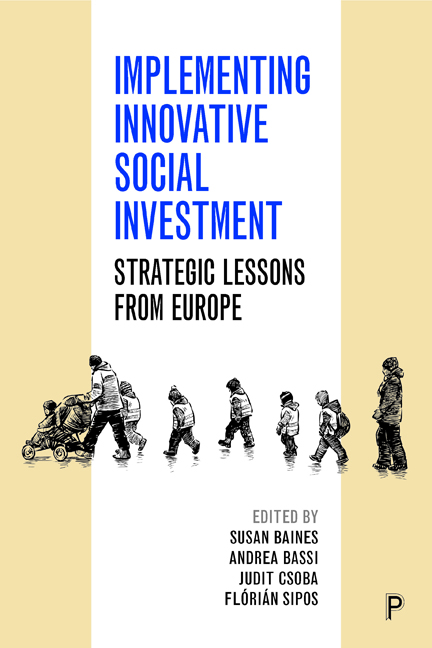Book contents
- Frontmatter
- Contents
- List of tables, figures, images and boxes
- Notes on contributors
- Acknowledgement
- one Social Investment in welfare: a sub-national perspective
- Part A Children and families: early intervention in people’s life courses
- Part B From a caring state to an investing state: labour market activation
- Part C Social solidarity and Social Investment
- Index
four - Innovative voluntary and public sector partnership for the reception and integration of unaccompanied asylum-seeking children in Gothenburg, Sweden
Published online by Cambridge University Press: 21 April 2022
- Frontmatter
- Contents
- List of tables, figures, images and boxes
- Notes on contributors
- Acknowledgement
- one Social Investment in welfare: a sub-national perspective
- Part A Children and families: early intervention in people’s life courses
- Part B From a caring state to an investing state: labour market activation
- Part C Social solidarity and Social Investment
- Index
Summary
Introduction
Since 2014, the Swedish welfare state has been facing the major policy challenge of accommodating and integrating asylum-seeking children without parents, so-called unaccompanied minors. This inflow, amounting to 40% of all those registered in the European Union (EU) member states, was the largest in Europe and historically unprecedented. This chapter discusses the potential of a form of partnerships, novel in Sweden, between local government and civil society organisations (CSOs) in Social Investment. The case in focus is a unique partnership between Gothenburg municipality, or, more precisely, its Social Resource Department (SRD), and nine valuebased CSOs, aiming to address some of the public policy challenges associated with the reception and integration of unaccompanied children. Its major beneficiaries were a shifting group of about 100–150 unaccompanied minors, aged 18 or younger, who were residing in partnership youth housing units during their asylum-seeking process and initial stay in Sweden. All these minors were allocated to Gothenburg municipality by the County Administrative Board.
Voluntary partnerships between value-driven CSOs and the public sector (voluntary and public sector partnerships; henceforth, IOPs) on varying social and welfare issues of public interest have started spreading since the first Swedish pioneering case in Västeras municipality in 2012. IOPs are envisioned by their major promoters as an innovative form of cross-sector collaboration that is distinct from state and CSO relations in social and welfare services in terms of state grants and market-based contracts. The partnerships aim at respecting and highlighting the uniqueness of CSOs through more transparent and equal collaboration terms guided by principles detailed in the national compacts (Regeringskansliet, 2009, 2010). As this form of governance is just emerging, it faces its own challenges in how to make the most of the CSO potential.
The aim of this chapter is to highlight how IOPs may serve as innovative social investments in local contexts. What follows describes the background to the partnership on integrating unaccompanied minors and the envisioned Theory of Change (ToC). It then explores and exemplifies partnership outputs and their early impact on targeted children, followed by an overview of major implementation challenges and success factors. It concludes with reflections on future policy implications.
- Type
- Chapter
- Information
- Implementing Innovative Social InvestmentStrategic Lessons from Europe, pp. 59 - 78Publisher: Bristol University PressPrint publication year: 2019

